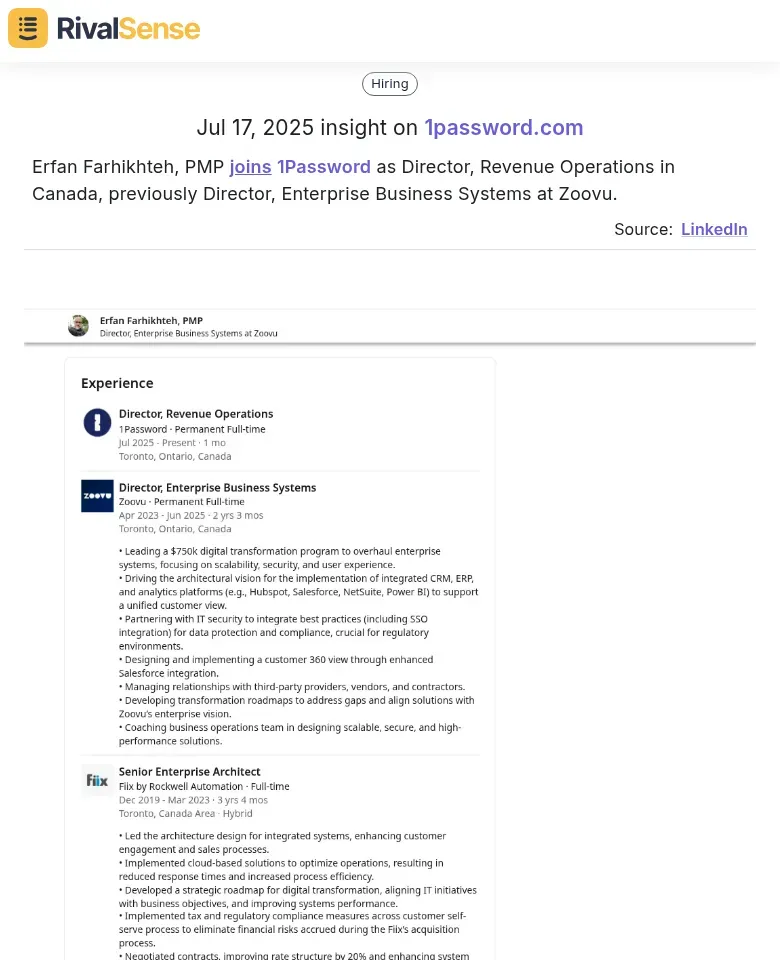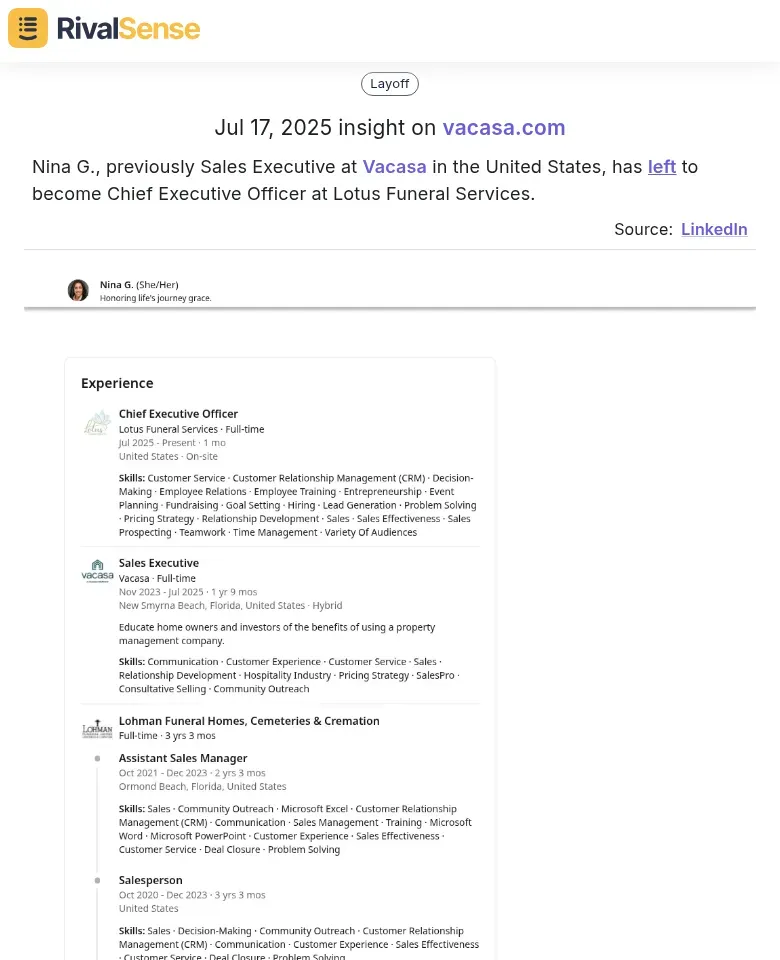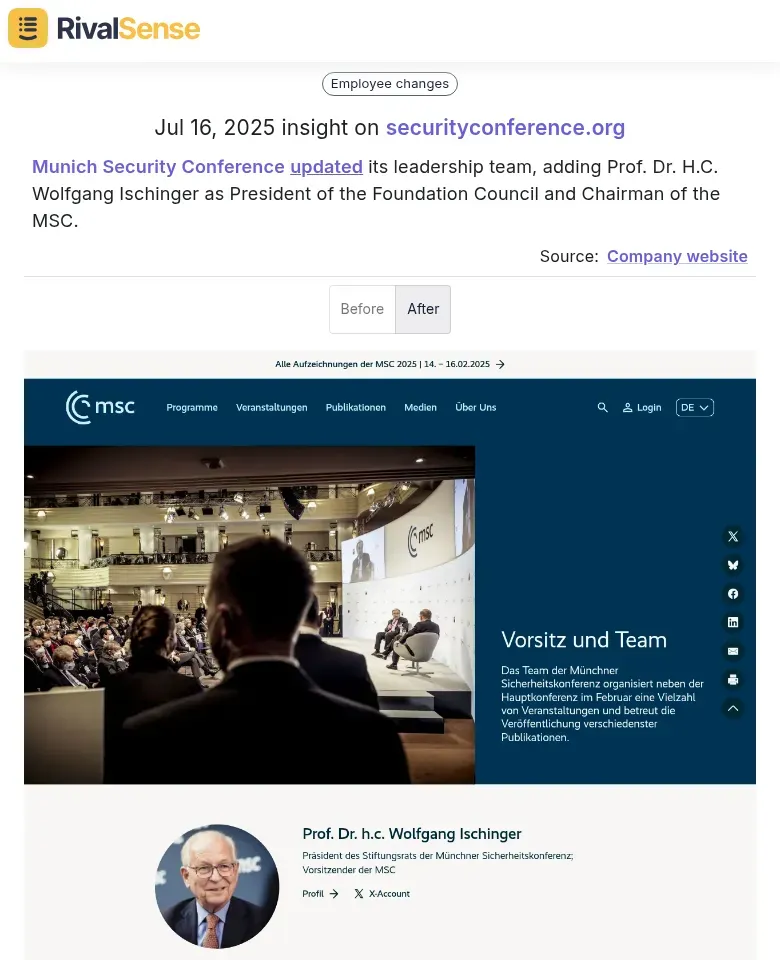Step-by-Step Guide to Tracking Competitor Hiring and Layoffs
Understanding competitor hiring and layoff trends is a goldmine for strategic insights. Monitoring these changes helps you gauge a competitor's growth trajectory, financial health, and market focus. For instance, a surge in hiring for AI roles could signal a pivot towards AI-driven solutions, while layoffs might indicate cost-cutting or restructuring. These personnel shifts often mirror broader market trends, offering clues about emerging opportunities or threats.
To effectively track these changes:
- Identify Competitors 🎯: List your top competitors and their key departments
- Leverage Tools ⚙️: Use platforms like LinkedIn Talent Insights or RivalSense for automated tracking
- Set Alerts 🔔: Configure notifications for job postings and layoff news
- Analyze Trends 📊: Look for patterns to predict competitor moves
- Benchmark 📏: Compare hiring strategies to identify gaps
By systematically tracking these changes, you can uncover actionable insights to refine your business strategy.
🔍 Identifying Key Personnel Changes
Spotting key personnel changes in competitor organizations is crucial for understanding their strategic direction. Executive moves often precede major strategic pivots, making early detection vital for proactive planning.
Practical methods:
- Monitor LinkedIn Activity: Set up alerts for key executives' profile changes
- Analyze Job Postings: Sudden senior role listings indicate upcoming shifts
- Follow Industry News: Subscribe to newsletters for official announcements
Checklist for tracking:
✅ Create role watchlist (C-suite, product leads)
✅ Use LinkedIn's "People Also Viewed" feature
✅ Track employee tenure patterns
Real-World Example:
RivalSense detected that Erfan Farhikhteh joined 1Password as Director of Revenue Operations after leaving Zoovu. This insight is valuable because such revenue operations hires often precede pricing strategy changes or sales model transformations.

👑 Analyzing the Impact of Leadership Changes
Leadership transitions fundamentally reshape company strategy and competitive dynamics. New executives bring fresh priorities that can redirect R&D focus, alter partnership approaches, or change market positioning.
Why it matters:
- CEO changes typically signal strategic overhauls within 6-12 months
- Department heads influence product roadmaps and hiring priorities
- Cultural shifts affect talent retention and operational efficiency
Action steps:
- Track leadership announcements on company websites
- Analyze new leaders' backgrounds for strategic clues
- Note accompanying job posting/layoff patterns
- Adjust competitive strategy based on insights
Real-World Insight:
When RivalSense identified Nina G.'s move from Vacasa to CEO of Lotus Funeral Services, it signaled potential market expansion. Tracking such executive changes helps anticipate new competitive threats in adjacent markets.

📉 Understanding the Implications of Layoffs
Layoffs reveal critical intelligence about competitor stability and strategic focus. Not all reductions indicate trouble—some represent strategic restructuring to fuel growth areas. The key is analyzing context and patterns.
Decoding signals:
- Department-specific cuts: R&D reductions may signal innovation pullback
- Scale matters: Repeated layoffs suggest deeper issues
- Timing clues: Earnings call announcements vs. quiet reductions
Strategic opportunities:
💡 Recruit newly available specialized talent
💡 Capitalize on competitor operational disruption
💡 Identify market gaps from abandoned initiatives
Monitoring checklist:
- [ ] Track layoff announcements across news/social media
- [ ] Analyze affected departments
- [ ] Note leadership changes during transitions
- [ ] Engage displaced talent strategically
🚀 Leveraging Insights for Strategic Advantage
Competitor talent movements provide actionable intelligence for your business planning. Converting raw data into strategy requires systematic analysis and integration into decision cycles.
Practical applications:
- Hiring Strategy: Mirror competitor skill acquisitions in growth areas
- Product Development: Anticipate market shifts from R&D hiring spikes
- Financial Planning: Prepare for market contractions signaled by layoffs
Optimization framework:
| Activity | Tool | Frequency |
|---|---|---|
| Job Post Tracking | LinkedIn/RivalSense | Daily |
| Leadership Moves | Company websites | Weekly |
| Layoff Analysis | News aggregators | Real-time |
Best practices:
- Benchmark hiring rates against competitors
- Create talent pipeline from competitor layoffs
- Adjust business focus based on personnel patterns
Conclusion and Next Steps
Tracking competitor talent movements delivers strategic foresight into market shifts, financial health, and operational priorities. Consistent monitoring transforms personnel changes into actionable intelligence for your growth strategy.
Immediate actions:
- Identify 3-5 key competitors for focused tracking
- Configure Google Alerts for their hiring/layoff news
- Establish weekly review cadence for findings
For comprehensive competitor intelligence—including leadership changes, product launches, and regulatory updates—try RivalSense. Our platform monitors thousands of sources to deliver actionable insights in weekly reports.
Get your first competitor report today:
👉 Try RivalSense Free
Real-World Example:
When Munich Security Conference added Prof. Dr. H.C. Wolfgang Ischinger to its leadership team, RivalSense subscribers gained early insight into potential policy focus shifts. Such high-level appointments often precede strategic realignments affecting entire industries.

📚 Read more
👉 Decoding Competitor Security Moves: Sprout Social's 2FA Enforcement
👉 Competitor Community Engagement Analysis: A Practical Guide for Business Leaders
👉 Boost Growth with Competitive Intelligence in Online Marketing
👉 How Sumsub's Expansion Spurred Rival's Strategic Shift
👉 B2B Competitive Research: Internet Insights Workflow Breakdown
